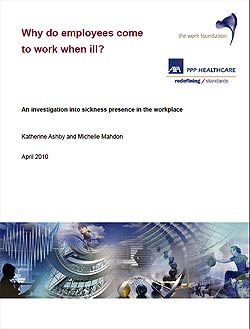Report Shows Facts Don't Inform Sickness Policies
The cost of working when ill could match or account for 1.5 times more working time lost than the cost of sickness absence, according to a new report out today from The Work Foundation.
 The report also highlights the lack of imagination amongst UK's employers and the view that employing people whilst they are sick will cut costs. Whilst not commenting on the new Fit Note procedures, it does provide argument for those against the introduction of the Fit Note and who hold concerns about the future health condition of the working population that will result.
The report also highlights the lack of imagination amongst UK's employers and the view that employing people whilst they are sick will cut costs. Whilst not commenting on the new Fit Note procedures, it does provide argument for those against the introduction of the Fit Note and who hold concerns about the future health condition of the working population that will result.
The Work Foundation's website in highlighting this report says:
"This leading-edge report emphasises that employers should not ignore the impact of sickness presence – working when ill- as it relates to lower performance, higher sickness absence, higher work-related stress and poorer psychological wellbeing."
The 72 page report presents the findings from a multi-method research project commissioned by
AXA PPP to investigate why employees come into work despite judging their health as such
that they could have justifiably taken sick leave. Crucially, this project explores relationships
between attending work when ill and performance – both employees’ own self-reported
performance when they are unwell and their line managers’ overall yearly objective ratings of
their performance.
Some of the key findings of the report highlight the importance of better understanding and addressing the issue of
sickness presence:
• Unlike sickness absence, sickness presence was significantly related
to performance.
• Higher levels of sickness presence were associated with lower manager assessed
performance, reduced psychological wellbeing and higher levels of sickness absence.
• Sickness presence was more prevalent than sickness absence: 45 per cent of
employees reported one or more days of sickness presence compared with 18 per
cent reporting sickness absence over the same period.
• Three factors, two of which were work related, were significantly linked with higher
levels of sickness presence, including:
• Personal financial difficulties;
• Work-related stress;
• Perceived workplace pressure (from senior managers, line managers and
colleagues) to attend work when unwell.
• Employees with lower levels of perceived workplace pressure, lower work-related
stress and fewer personal financial difficulties reported fewer days of sickness presence
compared to those with higher levels of workplace pressure, work-related stress and
greater financial difficulties.
• As well as reporting a higher number of days’ sickness presence, employees who
perceived pressure from managers and colleagues to work when unwell were also
more likely to report that their performance was adversely affected by working when
unwell.
• Employees who were unable to adjust their work around their health problem were also
more likely to report that their performance was adversely affected by working unwell.
• Those employees who were finding it difficult to make ends meet, who were unable to
save and who were worried a great deal about debt had a significantly higher number
of sickness presence days than those without these problems.
The executive summary lists the following as key recommendations:
• Workplace culture: How absence management policies are understood and applied
by managers at all levels of the organisation requires attention. Are policies applied
consistently? Do employees understand how the company’s sickness absence
management systems and processes can benefit them?
• Line managers: Line managers’ capability to deal with work-related stress, including
the managerial and organisational causes of reduced psychological wellbeing and
stress, should be prioritised.
• Ability to adjust work to health problems: The fit note, with its emphasis on capability,
should provide AXA PPP and other organisations with a constructive opportunity to
review how managers and their teams currently work together to help adjust work for
employees and accommodate their health problems.
• Workplace financial support for employees: We recommend further evaluation of
the uptake and benefits of workplace financial education offered at AXA PPP. Is the
right type of support reaching those who need it?
• Further monitoring and evaluation: Ongoing monitoring and evaluation will be
required to assess the level of employee health and wellbeing and to evaluate the
effectiveness of any targeted interventions.
The report does provide the following caveat:
".... it is important to keep in mind that research into sickness presence is still in its
infancy, especially when compared with the body of work on absence. Causality cannot be
established from these findings and, as other researchers have highlighted, there are still many
unknowns in this field."
It adds that:
"Further monitoring of sickness presence and the factors associated with
it is needed in the UK. Longitudinal studies tracking the effects of sickness presence over time
on wellbeing and performance are also required. We hope this research can raise the profile of
sickness presence as an indicator of health and wellbeing and act as a point of departure for
future exploration of these important issues."
It remains to be seen as to whether any notice will be taken of the findings of this report. Skeptics will say that it will make no difference to those who argue against the facts and claim that Britain has a sick-note culture caused by lazy workers. When it comes to employment policies few allow the true facts to get in the way of the drive for profit, despite this report showing that such attitudes are in fact more dangerous for the profits of the business and the health of the workforce.
Click the pic to download the report from the E-Library Database
Source: Workers Foundation / Unionsafety